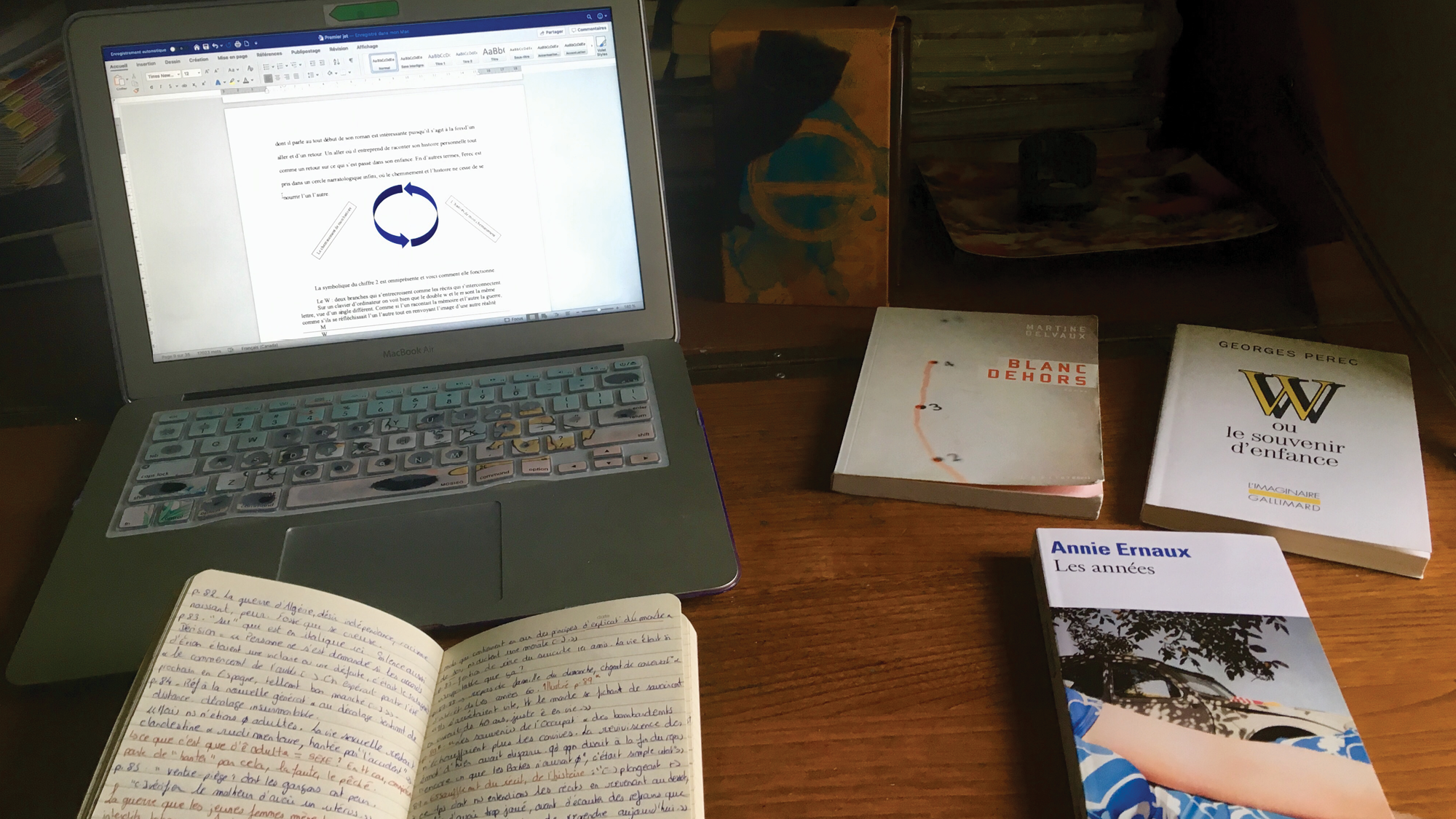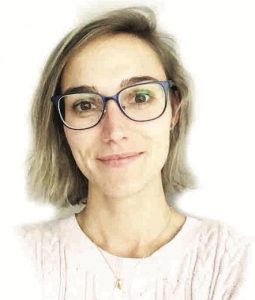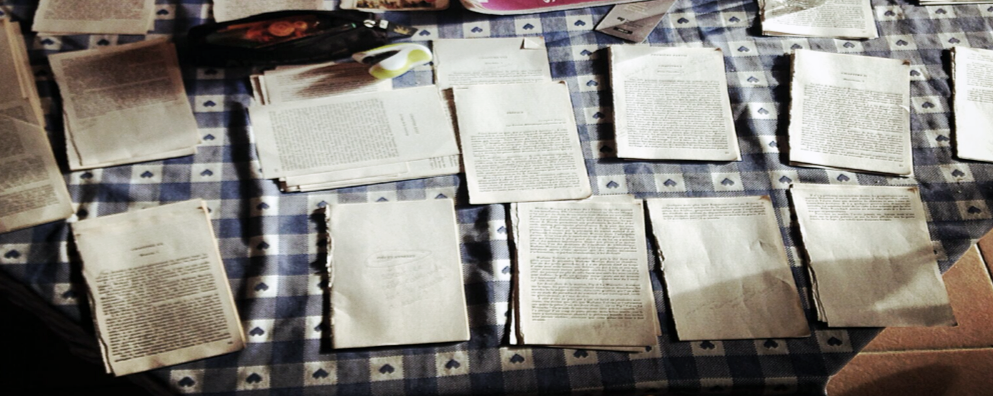PhD student in French Studies, Magali Blanc, explores how auto-fictional writers attempt to regain part of their missing heritage in an effort to complete their identities.


“The fine line between fiction and reality has been shattered; we notice more and more that authors endlessly reinvent the relationship between the “two worlds” genre. This ongoing process appeals to each and every one of us, for we live in a world where the human being is continuously trying to recreate itself.”
Part 1: Research


Magali Blanc, PhD Student
What is your research topic?
I study ‘the construction of the self without the parental figure’ in auto-fictional novels within Contemporary French Literature. I was drawn to this topic because I am fascinated by stories – the complexity of the characters, the thought processes of the authors, and the role that readers play.
I am captivated by the frontier that lies between our reality and the novels’ reality. I believe there is a kind of “in-between” to be explored, which is why I chose this area of interest.
Focusing on three Francophone authors — Georges Perec, Annie Ernaux and Martine Delvaux — my research examines how the process of ‘constructing the self’ happens when a parent is missing (through wars, social issues, abandonment, etc.). By projecting or creating a ‘fictional self’, the authors are filling a void with the process of “writing themselves”. Through this process, they are trying to regain part of their missing heritage in order to complete their own identity. The novel they create will reveal a truth long-hidden from themselves.
Novels can teach us so much about the reality we live in and, best of all, inspire us to travel and discover different cultures. They can make us grow as people. My research topic is closely intertwined with my passion for literature.
What insights have you gained so far?
I noticed that some authors from the 20th and 21st centuries search for a better understanding of their pasts.
As Laurent Demanze points out in his book, the contemporary writer is a “problematic heir” who “pieces together stories of their lineage to unearth the remains of a tattered heritage and mend the remaining scraps of his memory” (Laurent Demanze, Encres orphelines : Pierre Bergounioux, Gérard Macé, Pierre Michon, p. 9). This contemporary writer tries to weave links between the different individual memories of his family in order to reconstruct the memory puzzle of his own (hi)story. Knowing (or trying to know) what happened to their family members helps the subjects of my research build, and above all, reconcile with their own identity.
As I gather evidence for my thesis, I have found that there is no definite answer to this complex self. What the authors unveil in their stories by projecting a ‘fictional self’ is that no matter how deeply we look for answers to what makes us who we are as human beings, what we discover creates a sensation of fulfilment and emptiness all at once. The ‘fictional self’ serves as a revealing tool to the authors’ own identities; there is no need to look for more answers when we accept that the human being is whole because of his emptiness.
How does your research impact the wider community?
I believe my research will open a new window into thinking thoroughly about our relationship with literature and how it shapes us in more ways than just the educational.
The fine line between fiction and reality has been shattered; we notice more and more that authors endlessly reinvent the relationship between the “two worlds” genre. This ongoing process appeals to each and every one of us, for we live in a world where the human being is continuously trying to recreate itself.
Literature is key to understanding the world we live in, or used to live in.


Chapitres découpés: The novel W ou le souvenir d’enfance (1975) by Georges Perec jumps back and forth between three different stories, so I analyzed it by cutting the sections of each story out and piecing them back together.
Part 2: Graduate Student Experience
Why did you pursue graduate studies?
I pursued graduate studies because I was passionate about literature and research. After my exchange year in 2012 at the University of Victoria, I knew I had found a home in my academic career. I thought it would be a unique opportunity to study in a North American university – and I always go where opportunity takes me! I also thought that having the complementary experiences of being an English graduate student in France and a French graduate student in English-speaking Canada would be incredibly enriching.
Why did you choose UBC?
I decided to study at UBC mainly because of my supervisors’ work. I also knew that I would benefit from the interesting research done by other professors in the Department of French, Hispanic and Italian Studies (FHIS) – not only in the French section, but in the Hispanic, Portuguese and Italian sections.
FHIS offers students the chance to study, learn, and make connections with other areas of academia. Literature brings people together, and FHIS embodies this philosophy.
Another important motivator was the chance to teach French courses at the beginner and intermediate levels as a Teaching Assistant. You can build a strong relationship with your instructors, who are always present to guide you to become a better teacher.
And, of course, it’s hard to compare anything to the campus life of UBC and its scenic surroundings! I will never get tired of the beautiful mountains and ocean view!
What is working with your graduate supervisors like?
Dr. Ralph Sarkonak and Dr. André Lamontagne are my co-supervisors. They are excellent scholars, professors and supervisors; it is a great pleasure to work with them. They are very precise and helpful when it comes to giving constructive feedback. Whenever I meet with them to discuss my dissertation, they always push me to go further in my thinking. They are also very supportive, taking the time to ask me about the struggles and joys that I experience in life.
What advice would you give to people who are discerning whether graduate school is for them?
Ask yourself the right questions. If you do decide to pursue graduate school, it should be your own choice. Always trust your instincts!
Graduate life will bring you lots of new experiences, adventures, opportunities, and intellectual and personal encounters; it will literally feed your brain! However, it is not for everyone, and you will have to overcome the challenges that come along with this choice. I believe life shows you the path to take, so make sure you always choose the one that it right for you as an individual.


